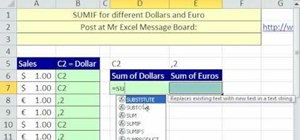

sum_range - the cells to sum if the condition is met.For numerical criteria, double quotation marks are not required. Please pay attention that any text criteria or criteria containing mathematical symbols must be enclosed in double quotation marks ("). So, the syntax of the SUMIF function is as follows:

If you've happened to read the COUNTIF tutorial on this blog, you won't have any difficulties with understanding Excel SUMIF because its syntax and usage is analogous.

The SUMIF function, also known as Excel conditional sum, is used to add cells based on a certain condition, or criteria. Why isn't my SUMIF formula working correctly?.Sum cells that correspond to non-empty cells.Sum cells that correspond to empty cells.Sum the largest or smallest numbers in a range.SUMIF examples with wildcard characters.Using comparison operators with cell references.Excel SUMIF formulas with text criteria.Sum if greater than, less than or equal to.Another great news is that once you've invested some time in learning SUMIF, it will take you very little effort to get the insight of other "IF" functions such as SUMIFS, COUNTIF, COUNTIFS, AVERAGEIF etc. This tutorial will briefly explain the function's syntax and general usage, and then we will apply the new knowledge in practice by making a few SUMIF formula examples.Ī good thing is that the SUMIF function is identical in all Excel versions, from 2016 to 2003. If you are faced with the task that requires conditional sum in Excel, the SUMIF function is what you need. This tutorial explains the Excel SUMIF function in plain English and provides a numbers of SUMIF formula examples for numbers, text, dates and wildcards.


 0 kommentar(er)
0 kommentar(er)
